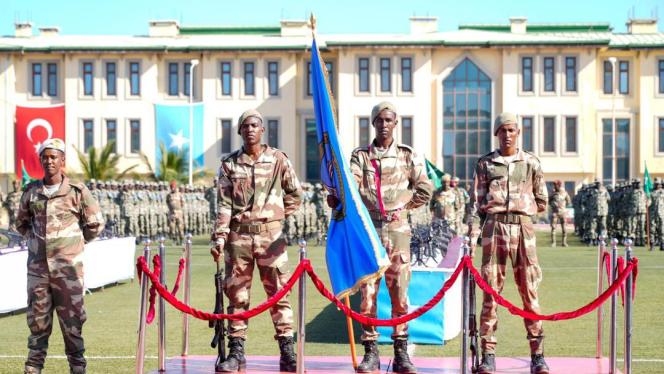Thursday 21 November 2024
Turkiye’s defence pact with Somalia comes at a time of increased tensions in the Horn

Turkiye’s pact with Somalia is a continuation of its cooperation with Mogadishu but is overshadowed by increased tensions between Somalia and Ethiopia.
The approval of the Defence and Economic Cooperation Framework Agreement signed between Somalia and Turkiye on February 8 by the Somali parliament has shone a spotlight on Turkiye’s foreign policy in east Africa.
The pact has come at a time of increasing tensions in the Horn of Africa, leading to speculation that Ankara could become embroiled in a diplomatic crisis between Somalia and Ethiopia sparked by a memorandum of understanding inked between Ethiopia and Somaliland. Hargeisa has said the memorandum would pave the way for Ethiopia to recognise its declaration of independence in exchange for Addis Ababa leasing a naval base along the Gulf of Aden. Mogadishu has described the preliminary agreement as an attempt by Ethiopia to annex its territory.
Somalia has appealed to the international community and countries with which it enjoys warm ties to help deter Ethiopia from implementing the memorandum. Late in January, Somalia’s president, Hassan Sheikh Mohamud, secured the backing of Egypt during a visit to Cairo and Turkiye has also vowed to support Somalia in the dispute.
Some actors in Somalia have interpreted the agreement between Mogadishu and Ankara as being related directly to the Ethiopian intention to finalise the memorandum and divide Somalia. Interior minister Ahmed Fiqi for example posted “Abiy is the one who makes us a group!!” on his X account.
However, as pointed out by Mehmet Ozkan, a professor at Turkiye’s National Defence University in a interviewwith Middle East Eye, Ankara places the agreement in the broader context of close military and political ties between Somalia and Turkiye and isn’t aimed at third countries.
Ozkan said: “Ankara isn't looking for adventure to go to war against other nations.” Omer Ozkizilcik, a non-resident fellow at the Atlantic Council, similarly told The New Arab: “It was expected that the Turkish-Somalia cooperation on land and air would be extended to the waters as well.”
Turkiye’s military and commercial presence in the Horn of Africa has grown significantly over the last two decades. Indeed, except for Eritrea, Turkiye’s military, its humanitarian organisations and companies play a large role in all countries in the Horn of Africa. In that regard, the agreement with Somalia fits a general pattern and not a departure from the norm.
What do we know about the deal so far?
Terms of the agreement haven’t yet been made public. However, at the press conference held in Mogadishu, Somali President Hasan Sheikh Mahmud said that with the agreement, a joint naval force will be establishedbetween the two countries and that these forces will protect Somali waters for 10 years and work to contribute to the development of undersea resources.
Following this hint given by Mahmud, it appears that Turkiye aims to accelerate the restructuring of the Somali naval forces within the scope of this agreement and to ensure that Mogadishu can protect its own territorial waters.
With this initiative, Turkiye will be able to stand out as an important actor serving not only the security of the seas around Somalia but also the security of a wider region around the Gulf of Aden, the Indian Ocean and the Red Sea. This dovetails with a change in Turkiye’s naval posture too. In 2020, Can Kasapoğlu, a Turkish security expert and a non-resident senior fellow at Hudson Institute, said Turkiye’s navy had shifted from primarily being a coastal deterrent to becoming a more assertive “blue water power projecting force.” He added that the “geopolitical character of the Turkish navy is changing.”
The Red Sea and the Gulf of Aden are of great strategic importance in global trade as sea routes frequently used by commercial ships. These routes, where billions of barrels of oil and other valuable commercial goods are transported every year, are places where pirates frequently attack. Between 2010 and 2015 for example, 358 pirate attacks occurred in Somali territorial waters. Houthi seizures of Israel, US and British linked ships have raised concerns recently alongside reports of the re-emergence of Somali pirates in these seas. Royal United Services Institute (RUSI) has reported that more attacks have taken place in the last few months than the last six years.
Regional states, especially Somalia, suffer great economic damage from these activities. It is very important for Turkiye to be an actor that ensures the security of this region with the support of successful national military maritime projects such as MİLGEM, which it has developed in recent years and its strong navy.
Potential risks that the Turkiye-Somalia Agreement may create for Turkiye
The agreement isn’t free of risk for Turkiye. Though some actors have interpreted the move as being aimed at Ethiopia, this does not comply with the east Africa policy that Turkiye has been trying to develop for many years. Turkiye and Ethiopia’s interests broadly converge in Somalia in terms of combating al-Shabaab. Turkiye’s companies are also Ethiopia’s second largest source of FDI. While there was only 1 Turkish company in Ethiopia in 2003, today more than 200 Turkish companies operate in Ethiopia’s fast-growing economy as one of the country’s main private sector employers.
In August 2021, the two countries signed a military agreement, providing mutual exchange of military personnel and on-the-job training after Abiy Ahmed headed to Ankara to meet Turkish president Recep Tayyip Erdoğan. The visit came as the rebel Tigray People’s Liberation Front (TPLF) threatened the Ethiopian capital, Addis Ababa, and UAVs obtained from Turkiye made a crucial impact in thwarting the TPLF offensive. In addition, Turkiye has produced AKINCI TİHA, an armed unmanned aerial vehicle of a high-altitude long endurance class, for Ethiopia.
An anonymous Turkish official quoted by Turkiye’s public broadcaster TRT World said Turkiye thinks of Ethiopia as part of the “greater Middle East.” The official said: “Any instability in Ethiopia can spread to other regions, having consequences across the Middle East.”
As a result, although Ethiopia may be uncomfortable with Turkiye signing this agreement with Somalia, it is unlikely to negatively impact ties between Ankara and Addis Ababa, and Turkiye will probably use its leverage with both countries to mediate the dispute between the parties.
A more persistent risk for Ankara’s operations in the Horn is al-Shabaab. The organisation recently assassinated Emirati troops (and a Bahraini) training members of Somalia’s army, demonstrating its ability and will to attack Somalia’s security partners. Following the approval of the defense agreement, al-Shabaab released a press statement on February 21, saying: “Somalia's air, sea and land are not for sale!” The militant group said it did not recognize this agreement and has been known to target Turkish workers and assets in Mogadishu.
Domestic reactions to the agreement in Turkiye
The initiative needs to be ratified by Turkiye’s parliament but has received mixed reactions across the country’s political spectrum. The main opposition party, the secular Republican People’s party (CHP), has voiced its objections to the deal. Though Ismail Cem, a former foreign minister and leading Kemalist intellectual, arguedthat Turkiye needed a more multi-dimensional foreign policy engaging the Middle East and Africa, the modern CHP’s view of world affairs is much more western-oriented.
As a result, the party and media organisations close to it view Turkish foreign policy initiatives towards countries in the Global South as unnecessary. In 2021, for example, ODA TV, an online news site, harshly criticised Turkiye’s decision to provide 30 million dollars of aid to Somalia while it had economic problems within itself.
Retired Rear Admiral Yankı Bağcıoğlu, a member of the CHP’s party council and former member of Turkiye’s navy, told the Cumhuriyet newspaper: “Are we going to send Turkish armed forces personnel for an open-ended and ambiguous mission far away from the homeland to protect the interests of another state? It is for homeland protection.” Bağcıoğlu also expressed concern about the security responsibilities the agreement gives Turkiye in Somali waters. “What will happen if, for example, an Italian or Spanish fishing vessel is encountered in Somali territorial waters/EEZ? Will Turkish ships intervene in the territorial waters of Somalia against the ships of a NATO/EU member state?”
CHP Istanbul MP Erdoğan Toprak also displayed an opposing attitude towards the agreement, commenting that it “may force Turkiye to take sides in the conflicts in the region.” Elsewhere, Toprak claimed that the agreement may make Turkiye a party to the dispute between Egypt and Ethiopia over the access to the Nile and the broader competition between the US and China in Africa. They generally represent an isolation tendency in Turkish foreign policy.
However, not all opposition parties have criticised or opposed the agreement. For example, Kani Torun (also a former ambassador to Somalia), who is a member of parliament in the conservative Gelecek party, which is led by former prime minister Ahmet Davutoğlu, congratulated Erdoğan for brokering the agreement in his social media posts and stated that Turkiye is the guarantor of the security of the brotherly peoples in east Africa.
Mahmut Rıdvan Nazırlı, a parliamentarian for Justice and Development party (AKP) and member of the foreign affairs committee said the deal was evidence of Turkiye taking “important steps one after another in Africa.” On X, he posted that the deal would see Turkiye gain access to 30% of the resources in the Somali Exclusive Economic Zone, adding that: “Thanks to this agreement, our state has become a country that has a say in the Mediterranean, the Gulf of Aden and the Red Sea.” Framing the foreign policy move within the context of Turkiye’s historic role in the region from the 16th century fighting Portugal alongside Somali sultanates, Nazırlı concluded with a prayer for Özdemir Pasha, a Mamluk general, who died in Yemen.
The governing AKP’s main coalition partner, the Nationalist Movement party (MHP), and its related organisations have similarly viewed the deal in a very positive light. In a post on X, Selim Han Yenicun, a senior figure in the nationalist Ülkü Ocakları (Idealist Hearths), described the pact as an example of Turkiye’s growing influence in global politics: “If today we see an active Turkiye in Libya, Egypt, Ethiopia, Sudan, Eritrea, Djibouti and Somalia, and even on the Saudi Arabia-Gulf line, believe me, we will talk about the decisive role of the Turkish economy, Turkish culture and Turkish defence industry in the global transit routes in the next decade.”






